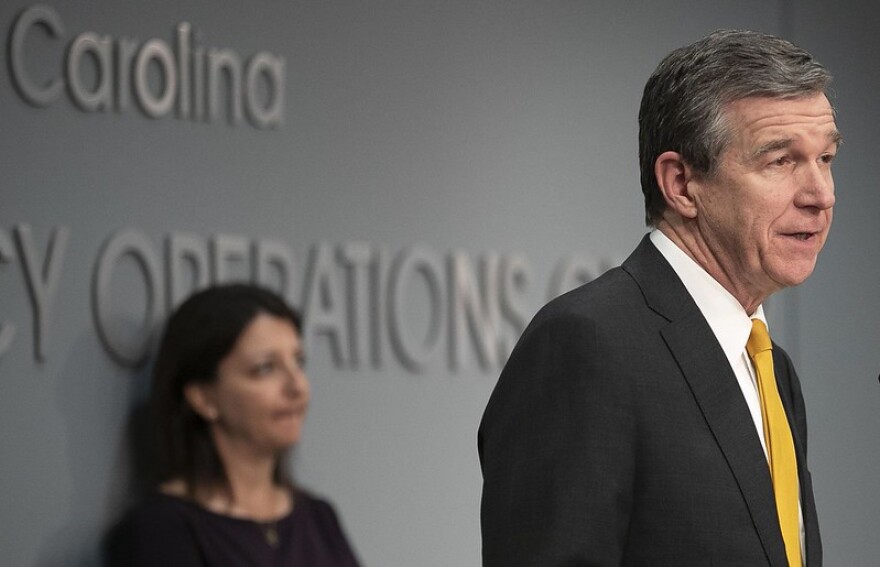North Carolina elementary schools will soon be allowed to return to daily, in-person classes, Democratic Gov. Roy Cooper announced on Thursday.
School districts will be allowed to welcome back kindergarten through fifth grade students at full capacity, if they choose.
The decision on whether to return to full in-person instruction will be left up to individual districts. Those choosing to go forward with the Plan A reopening option starting on Oct. 5 won't be limited in the number of students who can be inside a classroom. They would, however, be required to screen kids for coronavirus symptoms, make sure they wear face coverings and offer remote options for parents concerned about their kids bringing the virus back home.
ŌĆ£We are giving them one more option here, that they can look at,ŌĆØ Cooper said. ŌĆ£They would obviously need to look at their local metrics, and look at the situation that they are in, but it is an option for them and something to consider.ŌĆØ
Up to now, school districts could choose between all remote classes, or opening schools at partial capacity with social distancing. Cooper said statewide COVID-19 trends have been improving, allowing for this step. Positive test rates are nearing 5% and hospitalizations are down.
The governor and Dr. Mandy Cohen, the state's top public health official, did not outline a timeline for when they'd consider letting middle schools and high schools transition to 100% physical instruction. When classes began last month, most K-12 public school students were on Plan C, which provided fully remote learning, while others adopted the Plan B model providing for a mix of online and in-person instruction.
Cooper said the state's improved coronavirus numbers and the lower likelihood of infection and transmission among younger people fueled his decision to let elementary schools reopen to more students.
ŌĆ£Districts will have the ability to select a plan based on their unique situation,ŌĆØ Cooper said. ŌĆ£We're able to open this option because most North Carolinians have doubled down on our safety and prevention measures and stabilized our numbers. The science of lower viral spread among children also backs up this decision.

ŌĆ£The number one opening priority during this pandemic has been our schools, and our continuing progress in fighting the spread of this virus is allowing us to do a little more.ŌĆØ
But Republicans calling for a blanket reopening of all K-12 schools accuse Cooper of letting politics drive his decision.
ŌĆ£We continue to hear that these decisions are being made based on ŌĆśscience.ŌĆÖ What is the science that says itŌĆÖs safe for 5th graders to be in school full time, but itŌĆÖs not safe for 6th graders?ŌĆØ said a statement from Phil Berger, the Republican leader of the state Senate.
Cooper's GOP gubernatorial challenger, Lt. Gov. Dan Forest, said in a news conference on Wednesday that without any requirements for teachers or students to wear masks. Instead, he wants individual districts to determine the health and safety protocols for their community.
Cooper called Forest's comments ŌĆ£irresponsible" and noted it conflicts with overwhelming scientific evidence of the benefits of mask wearing.
Cooper has still been criticized by Republicans for being too cautious and inconsistent in his approach to reopening. His current executive order prevents bars from reopening, while simultaneously allowing President Donald Trump to .
Cooper's order mandates mask wearing statewide and limits gathering to 25 people indoors and 50 people outdoors.
Cohen, who has long said the Cooper administration is making data-based decisions, stressed the need to prioritize younger children in the K-12 reopening plan.
ŌĆ£Younger children are less likely to become infected, have symptoms, experience severe disease and spread the virus to others,ŌĆØ Cohen said. ŌĆ£The science also shows that in-person learning is so important for the development of all children, especially for younger children.ŌĆØ
North Carolina has reported only four fatalities among those younger than 25, out of a total of 3,180 COVID-related deaths North Carolina has seen since the start of the pandemic. The public health department's shows zero deaths, eight clusters and 47 coronavirus cases linked to school settings.
Of the more than 4,000 college students in the state who have tested positive for the virus since in-person classes resumed in August, the state health department told The Associated Press on Thursday that its surveillance data found that just ŌĆ£one individual linked to a college or university was admitted to a hospital.ŌĆØ












